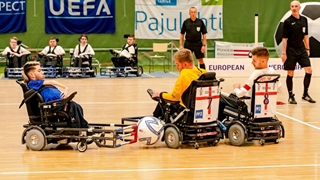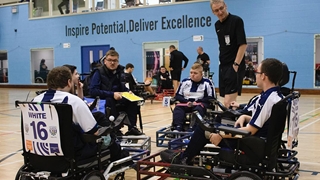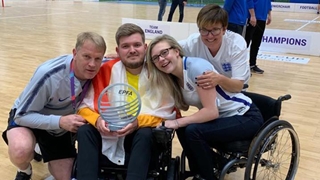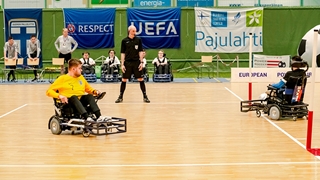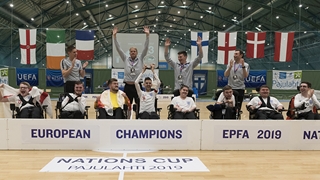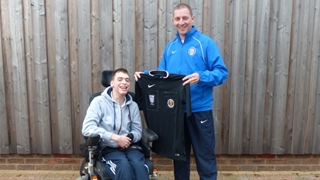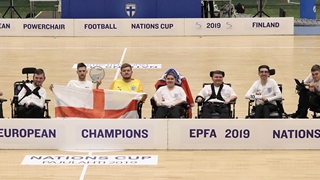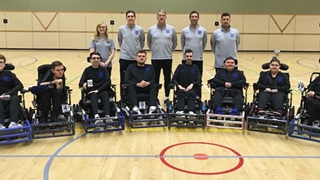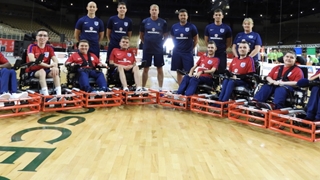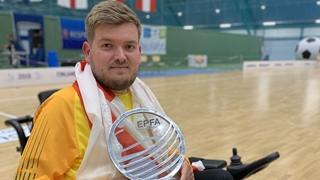
For as long as I can remember, my life has been dedicated to football.
All I could think about growing up was playing football with my brother or friends and looking to emulate my childhood heroes, who I would watch on TV.
However, my childhood wasn’t a normal one. Growing up with a genetic condition called Spinal Muscular Atrophy was difficult.
When I was young, I didn’t know or notice any difference between me and my able-bodied friends. I would jump out of my wheelchair and play football on my hands and knees, diving around in goal, pushing myself up to make save after save and ready to try and keep the ball out of my goal.
However, as I got older it became much harder for me physically and I could no longer play and compete as I once did.
Emotionally that was really difficult, I remember bursting into tears on numerous occasions, often sobbing with my parents in an almost confused state and not understanding why this was happening to me.
I was surrounded by friends at school who could live without a fear in the world and chase their dreams, all at a time where mine felt like they had been taken away.
All I ever wanted to do was play football and not being able to jump out of my wheelchair like I could when I was younger was really hard to accept.
I just knuckled down and got on with it. What choice did I have?
My parents always encouraged me to find alternative ways to get involved so I was always adapting to my disability trying to find new ways to play football.
I would perch on the edge of my Powerchair and kick a football around the garden for hours, and also help coach a local Sunday League team that many of my friends played for.
I’ve lost count of the amount of times I would get my foot caught under my wheelchair and sprain my ankle or fall out of my chair all together and land in a heap on the floor with a bloody nose to show for it.
But despite the bumps and bruises this quickly became the new normal and the enjoyment and passion for football returned.
I continued to find new ways of getting involved in sport as my condition progressed, and don’t get me wrong I wasn’t just playing for playing sake, I was extremely competitive despite the circumstances and wanted to be the best.
I played in goal for the school team in my powered wheelchair, travelling to other schools and competing against other teams.
To some the thought of a young lad in a wheelchair trying to compete in those sporting contexts might sound crazy, but to me it was the norm. I was determined not to let my disability get in the way of me living a normal life, no matter what difficulties I would come up against.
Of course, it was difficult emotionally more than anything as I could envisage what I wanted to do but my body just wouldn’t let me, it was heart breaking at times.
I was desperate to compete on a level playing field where I could just be me and not feel like I was being held back by my disability and the various barriers that came with it.
And it wasn’t until I found out about Powerchair Football that I finally felt comfortable with who I was.
When I first started, the sport was still in its infancy and there was no real structure in terms of a league format or local clubs so opportunities were few and far between.
I’d attend open sessions where I would come against boys and girls with similar disabilities to myself, and just try to be the best and dribble my way past opposing players and teams as if I was the late Diego Maradona or Lionel Messi.
The feeling of playing football without being held back by my disability was a breath of fresh air. Finally I could be free on a football pitch and not have to worry about my day-to-day struggles.
Fast forward a few years and Powerchair football really started to strive. A National League structure was formed and multiple clubs were set up in the local area, and there was even an international scene with a World Cup.
I joined West Bromwich Albion and was quickly made the club captain. This was the opportunity I had been desperate for and I was determined to make the most of it.
Success didn’t come instantly as there were some very good teams and players who had more experience playing Powerchair football than myself, so I’d work hard on my technique, training as often as possible in order to play catch up.
However, it wasn’t just club football that I was passionate about, the opportunity to represent England playing in a World Cup or European Championships would be a dream come true.
And my first involvement with the England squad came in 2011 and it was an honour to compete at the highest level.
I was so excited by the prospect of officially representing my country, pulling on the same kit as some of my childhood idols such as David Beckham, was something that I could only dream about when I was young.
I still remember the feeling of arriving at St George’s Park for the first time, the hairs on the back of my neck stood up instantly as I made my way down the long driveway and past all the immaculately prepared practice pitches.
To this day I still get an overwhelming feeling of pride when I arrive at St George’s Park, as it has this special aura that you can sense which immediately inspires you to better yourself.
With West Brom, where I was now player-manager, we won back-to National League titles and also our first FA Disability Cup and the feeling of being a winner was addictive. By now I was desperate to try and help the national team win our first international tournament when we went out to Finland for the 2019 European Championships.
Going into the tournament, our preparations were very similar to previous camps, we worked hard on the tactical side of the game and ironed out any issues or doubts that we had with the playing philosophy and we arrived in Finland with our usual self-optimism that it was going to be our year.
We knew that France, who were European and World champions, would be the team we needed to beat and we started the competition off with two emphatic wins over Northern Ireland and Austria.
But more important than the scoreline was the style of football we were playing and the extra confidence we had in our playing philosophy.
As soon as our games were done we would spend as much time as possible watching France and trying to understand the way they were looking to play and try to identify weaknesses in their game prior to coming up against them in the group.
When the eagerly-awaited group game arrived there was this overwhelming feeling that although we were playing for three points and both teams had already qualified for the semi-finals, we were about to discover who would go onto win the tournament for real.
But we really struggled to get our passing game flowing, which resulted in long periods in and around our own half and it was France who went on to win the game 3-0.
I remember at the end of the game having this strange feeling where, unlike previous losses, we didn’t really understand why we had lost the game.
While the squad were given some down time, the coaches watched the game back to analyse what went wrong and look for ways to make improvements for the final, should we meet again. We discussed our ideas and pulled together a game plan that would hopefully give us a better chance if and when we played them in the final.
The loss to France had definitely knocked our confidence, but we came through our remaining group games and semi-final with a 3-1 win against Demark, and the stage was set for another crack at the French.
Despite our previous result, we went into the game with confidence knowing that if we performed to our best that we could achieve our goal and win the competition.
When the game eventually got underway, it was a similar pattern to the first match and France took an early lead. The score remained 1-0 at the break but I remember the squad being quite upbeat and felt we were still in the game.
As the goalkeeper, it’s my responsibility of starting our attacking phases from deep and with that comes pressure on every pass, but I was made to pay ten minutes into the second half when France jumped onto a stray pass and scored to go 2-0 up in the game.
I was so angry with myself as I felt like I'd let the team down and with it, our chance of a comeback was now extremely unlikely. At that moment all we could do was try our best to perhaps score a goal and make the game interesting but despite my mistake I somehow managed to maintain my focus and drive the team forward from the back.
France continued to attack us and as each ball came into the area we were setup in a way where we could intercept their pass and quickly transition from defence to attack. So when a French corner was delivered, we quickly broke and two passes later it was 2-1 with ten minutes left, so game on!
As the game entered into the final moments, we gave away a free kick just to the left of our box. We set up patiently behind the ball and tried to limit the space for France to create an opportunity to score and kill off the game.
The ball was smashed into the box right into my zone and I managed to deflect the ball out wide towards my teammate Ed Common, who hit a long diagonal pass across the pitch in the hope that Marcus Harrison could get on the end of it.
From that moment it seemed like slow motion, the French players were desperately trying to get back towards their own goal and as the ball was switched across the pitch Marcus kept his composure and smashed the ball between the posts to equalise and take it to extra time!
We were buoyant by our chances of going all the way to snatch victory from the jaws of defeat and extra time was a cagey affair before the game finished 2-2 and would be decided by a penalty shootout.
The mood in the camp was unsurprisingly tense as we approached our technical area to sort out the order of the spot kicks but the coaching staff and the rest of the squad rallied around one last time as we all desperately tried to encourage each other.
I was desperate to go first, not to try and be a leader but because as the goalkeeper I always like to take my penalty first so I can focus on trying to save a penalty rather than thinking about my own.
I remember approaching the ball ready to take the first penalty, thinking about not wanting to be the player who lets the rest of the team down. The referee blew his whistle and I tried to remain calm and go through my pre-strike routine to ensure I made clean contact with the ball. Thankfully, I caught it clean and smashed the ball into the left corner of the goal…job done, now to try and save some!
I took my position on the goal line, moving around in unusual positons, while trying to maintain eye contact with the opposition as much as possible. The first player approached the ball and smashed it cleanly but he was just off with his line and the ball smashed the post and then cannoned off my front bumper and away from goal.
Finally, advantage England and we were now just three successful penalties from becoming European Champions.
Next up was our captain Jon Bolding, who powerfully dispatched his penalty into the bottom corner and we were one step closer to our goal.
The next two penalties for both teams resulted in misses, before the third kick saw the French goalkeeper move prior to Ed striking the ball, which should result in a retake, but the match officials deemed the penalty to be fair.
Despite our frustration there was nothing we could do other than get on with the game and when the next French penalty was struck powerfully against the post, we felt as if justice had been served.
We were now only one penalty from winning the shootout, and with it our first ever international competition!
Marcus, who had scored the two goals to help us complete our comeback, was next on the list and it seemed to take an age. While the match officials prepared the stage and briefed each player, myself and the rest of the squad eagerly waited on the halfway line, where we were going through all sorts of emotions. Some players chose not to watch, others held their hands to their face almost praying for the ball to go in.
As the whistle blew, time seemed to stand still…Marcus took aim, approached the ball, threw in a little feint to distract the goalkeeper, before smashing the ball past him and through the posts.
As the ball crossed the line, the rest of the squad and the coaching staff flooded onto the pitch and immense jubilation spilled out as family members and loved ones ran onto the court to celebrate with the team.
I was swamped by my girlfriend and family, and we all immediately burst into tears as this overwhelming feeling of euphoria seemed to eclipse all those difficult moments that I'd endured growing up in order fulfil that little boy’s dream of winning a major tournament playing for England.
Looking back, for me it will always be about what I achieved on the pitch that matters as I’m a competitor first and foremost and the only reason I play football is to try and be the best!
However, it’s fair to say Powerchair football has also provided me with some amazing life experiences that have certainly played a major role in shaping my future, all at a time where life growing up with a disability was all starting to feel quite difficult.
I’ve travelled around the world playing the sport that I love, had the opportunity to coach and pass on my knowledge and passion for the sport to young players and found work in the sports industry all while desperately trying to promote the sport and enhance its development. I’ve even met the love of my life through Powerchair football!
I hope to use the power of my story to inspire others and showcase the quality that disability sport has to offer and to try and put Powerchair football on the map.
I believe that the future of disability sport is bright, and that organisations such as the FA will continue to step up their efforts by using their platform and voice to educate the public and change the way disability is perceived.
For now, my passion and focus is very much still on the court, and I hope to be part of a successful England squad who travel over to Sydney in 2022 to win our very first World Cup but in the future when I do eventually ‘hang up the boots’, I’d like to manage the England Powerchair football team myself and continue the evolution of the beautiful game.

